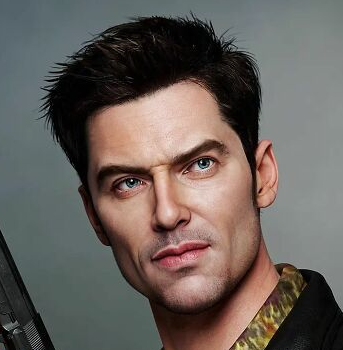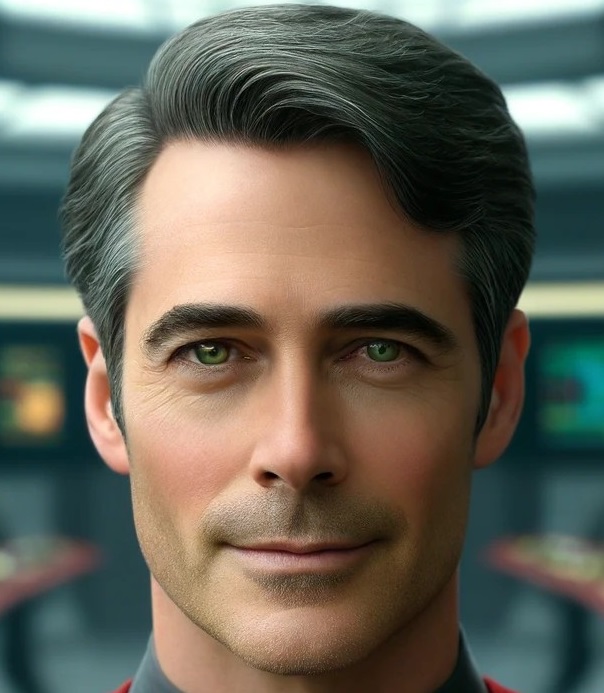Lieutenant Commander Zachary Brooks walked purposefully through the corridors on deck fourteen of the Ulysses toward Engineering Laboratory Four, his mind focused and his mood a blend of confidence and impatience. As the ship’s Operations Officer, Brooks knew that precision and speed were critical, especially given the tight schedule they were under to deploy the probe net.
Brooks entered the engineering lab. The lab was located near the ship’s warp core, ensuring quick access to the heart of the vessel’s power and systems. The room was spacious, lined with diagnostic stations, workbenches cluttered with tools, and shelves stocked with components. A large central console dominated the space, surrounded by smaller workstations with various screens displaying technical readouts.
Chimera’s Science Officer, Lieutenant Commander Kumar, waited for him in the lab. Kumar, a man of medium build with a composed demeanor and a meticulous nature, diligently arranged equipment and reviewed data on the center console. Kumar was known for his analytical mind and methodical approach to problem solving, qualities that earned him respect among his peers and superiors.
“Alright, Kumar,” Brooks said, his voice carrying an edge of arrogance as he approached. “Let’s get these probes ready to deploy. We’re on a tight schedule here.”
Kumar looked up, his expression calm despite Brooks’ brash entrance. “Indeed, we are. I’ve been analyzing the sensor data from the initial sweeps. The Underspace aperture’s fluctuations are more volatile than we anticipated.”
Brooks rolled his eyes slightly, his patience already wearing thin. “We don’t need to analyze it to death, Kumar. We need to get those probes in place. Time is of the essence.”
Kumar’s eyes narrowed slightly, though he remained composed. “Understanding the scientific details is crucial, Brooks. If we miscalculate, we could trigger another disturbance or miss crucial data.”
Kumar continued, his voice steady and measured. “The initial data from Ulysses’ sensors detected gravimetric shear near the Underspace aperture.
“Alright, explain how this affects our deployment.” Brooks folded his arms, impatience giving way to a flicker of interest.
Kumar turned to the console, bringing up a holographic display of the aperture and the surrounding space. “The gravimetric shear could cause spatial distortions, leading to probe malfunctions or even structural damage. Their data will be compromised if we don’t calibrate the probes to account for these distortions. We need to adjust the probe’s sensors to a higher frequency range to filter out the subspace interference. I’ve already started running simulations. The data suggests that a phased modulation in the probe’s sensor array will compensate for the gravimetric shear.”
Brooks looked at the data, then back at Kumar. “Alright, let’s do it your way. But we need to move fast. The Captain wants these probes deployed ASAP.”
They worked in tense silence for a few minutes, calibrating the sensors and configuring the probes for deployment. The air was thick with the hum of equipment and the silent clash of their conflicting approaches.
As they finished, Brooks broke the silence. “Look, Kumar, I get it. You’re a scientist, and you want to be thorough. But sometimes you need to move fast and make decisions on the fly.”
Kumar looked at Brooks, his expression thoughtful. “And sometimes, Brooks, you need to slow down and ensure you understand what you’re dealing with. It’s a balance.”
Brooks hit back immediately, his tone sharper. “You think I don’t know that? I’ve been in more tight spots than you can imagine, making calls that save lives. I don’t have the luxury to ponder every detail when the clock’s ticking.”
Kumar’s calm demeanor didn’t falter, but his eyes hardened. “And I’ve been in situations where a single oversight, a lack of understanding, almost cost us everything. There’s a reason Starfleet values both precision and decisiveness. We need both to succeed.”
Brooks leaned in, his frustration evident. “Fine, but remember this: out there, in the field, there’s no room for hesitation. When things go south, you’ll thank me for being ready to act.”
Kumar’s response was cool, almost icy. “And when the data we gather today prevents a disaster tomorrow, you’ll thank me for being thorough.”
The hum of the equipment and the soft beeps of the console filled the air, but the underlying friction between them was palpable.
“You know,” Brooks said, his voice cutting through the silence, “I get that you scientists love your data. But on the front lines, it’s about survival. Split-second decisions can mean the difference between life and death.”
Kumar didn’t look up from his console, his fingers deftly adjusting the parameters on the probe’s sensors. “And yet, those decisions are often based on the very data you dismiss. Without accurate information, those split-second decisions are nothing more than guesses.”
Brooks’ jaw tightened. “Guesses? I’ve saved entire crews with those ‘guesses.’ You don’t have the luxury of time when you’re out there, facing the unknown.”
Kumar finally met Brooks’ gaze, his eyes steady. “And when you make those decisions based on incomplete data, you risk everything. You could lose more than just a mission with one misstep, one wrong assumption. You could lose lives.”
Brooks scoffed. “I’ve been in Starfleet long enough to know that hesitation can be just as deadly. You hesitate, you die. Simple as that.”
“Ten years in Starfleet and only a handful of excitement.” Kumar shook his head slightly contemptuously. “It’s not about hesitation, Brooks. It’s about preparation. Understanding the variables and predicting the outcomes. It’s why we do what we do. To give you the best possible chance to make the right call.”
Brooks leaned closer, his voice low and intense. “And while you’re busy predicting outcomes, I’ll be out there making sure we don’t get blown to bits. We need to deploy these probes now, not tomorrow, not after another round of simulations.”
Kumar’s voice remained calm, but there was a steely edge. “And those simulations ensure that when we deploy the probe net, we get what we need to safeguard the area and advance our understanding of the universe. The gravimetric shear is not a minor detail, Brooks.”
Brooks threw up his hands in frustration. “You think I don’t know that? Do you think I don’t understand the stakes? I just don’t have the time to second-guess every move. We have a mission to complete.”
Kumar adjusted another setting on the probe, his movements precise. “And that mission will fail if we don’t account for these variables. The Underspace aperture is unpredictable. If we don’t deploy correctly, we could make things worse.”
Brooks took a deep breath, trying to reign in his frustration. “Alright, Kumar. If you want to run another simulation, fine. But make it quick. The clock’s ticking.”
Kumar nodded, his expression unreadable. “Understood. I’ll expedite the process. But remember, Brooks, thoroughness now means fewer surprises later.”
As the final adjustments were made and the probes were prepared for deployment, the tension between them remained. There was a clash of perspectives that neither was willing to back down from. They knew their combined efforts were crucial, even if their methods and priorities differed.
Brooks glanced at Kumar, a grudging respect in his eyes. “You know, for all your meticulousness, you do good work. Just don’t forget, sometimes you have to trust your gut.”
Kumar allowed a small smile to tug at the corner of his lips. “And you, Brooks, for all your brashness, have a point. Don’t forget that understanding the science behind gut feeling can make all the difference.”
Just as the tension seemed to ease, the doors to the lab slid open, and Commander Roshan entered. Brooks’s expression immediately hardened. She had a knack for appearing at the most inconvenient times, at least from Brooks’s perspective.
“Brooks, Kumar,” Roshan greeted, her eyes quickly taking in the scene. “I see you’re making progress.”
Brooks straightened, masking his annoyance. “Commander Roshan, we’re finalizing the probe calibrations. They’ll be ready for deployment shortly.”
Roshan nodded, stepping closer to the central console. “Good. The Captain wants an update on our status for transmission to higher headquarters. How soon can we deploy?”
Kumar spoke up, his tone professional. “We’re running a final simulation to ensure the probes are properly calibrated to handle the gravimetric shear near the Underspace aperture. It should be completed within the next few minutes.”
Brooks interjected, his impatience seeping through. “We can deploy as soon as the simulation is done. I’m confident in our setup.”
Roshan raised an eyebrow, sensing the underlying tension. “I trust both of your judgments, but remember, this task’s success relies on speed and accuracy. We can’t afford any mistakes.”
Kumar nodded, his demeanor calm. “Understood, Commander. We’re taking all necessary precautions to ensure the probes function as intended.”
Brooks forced a smile. “We’ll get it done, Commander. You can count on that.”
Roshan’s gaze shifted between them, her expression thoughtful. “Very well, Mister Brooks. Keep me informed of any developments. And Brooks, Kumar, I know you both have your own methods to get the job done, but remember, this particular job requires the best of both your skills.”
With that, Roshan turned and left the lab, leaving Brooks and Kumar to resume work. The brief interruption had only heightened the urgency of their task.
Brooks exhaled, shaking his head slightly. “That woman has a way of making everything feel even more pressing.”
“That’s her job. But she’s right, you know.” Kumar chuckled softly.
Brooks nodded, his frustration giving way to determination. “Alright, let’s finish this. We don’t have time to waste.”

 Bravo Fleet
Bravo Fleet









